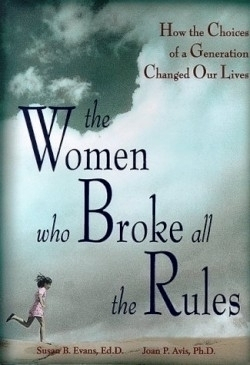It looks like you've stumbled upon a page meant to be read by our code instead of viewed directly. You're probably looking for this page.
The Women Who Broke All The Rules
How the Choices of a Generation Changed Our Lives
American women born between 1945 and 1955 came of age during a unique historical period. These women, raised with the traditional expectations of college, marriage and motherhood, reached adolescence during a time of enormous social change. How did this transitional generation negotiate unheard of freedoms and choices for women that most women now take for granted?
Evans, an authority in survey research methods, and Avis, a psychologist, call the women of this generation “torchbearers.” One hundred women born between 1945 and 1955 who had been continuously in the workforce since completing their education were interviewed. The research questionnaire included a chronological life history survey; a series of questions allowing each woman to consider her role as a pioneer in the women’s movement (whether she used that label or not); how she reconciled her fifties childhood with her adult self; and the role of men and families in her life.
The result is a very engaging social history of ordinary women with extraordinary stories. Diane, a marketing director for a large computer company, talks about the conflict between her childhood training and her current life: “I grew up in the purest, most unadulterated structure—a Catholic female upbringing. I remember going to politeness classes where they taught us how to eat potato chips with a spoon. I was conditioned for a life which I am not living.”
Interestingly, while these women are very accomplished and lead noteworthy lives, few acknowledge their own agency and power in creating these lives. The authors note that many of the women erroneously ascribed their accomplishments to good fortune rather than to risk taking any direct action; they note that “eschewing credit for one’s accomplishments seems to be a generation trait for those who grew up as 1950s ‘good girls.’”
Of interest is the appendix, which contains the interview questionnaire, which readers can take themselves, or use to interview their female friends and relatives. Also rewarding is a segment on advice for younger women. Although the book is almost exclusively a social history of white, middle-class American women, it does include a few stories from African-American, Asian-American, and Latino women. Specifically tailored for a general audience, the book would benefit a sociology or women’s studies course, or provide the foundation for an oral history project. The authors conclude: “We encourage Torchbearers to accept that they are trailblazers who deserve credit for their individual and generational achievements. They are members of a lucky generation, but it was not luck that brought them to where they are today…Remember that the only thing permanent is change.”
Reviewed by
Rebecca Maksel
Disclosure: This article is not an endorsement, but a review. The publisher of this book provided free copies of the book to have their book reviewed by a professional reviewer. No fee was paid by the publisher for this review. Foreword Reviews only recommends books that we love. Foreword Magazine, Inc. is disclosing this in accordance with the Federal Trade Commission’s 16 CFR, Part 255.
